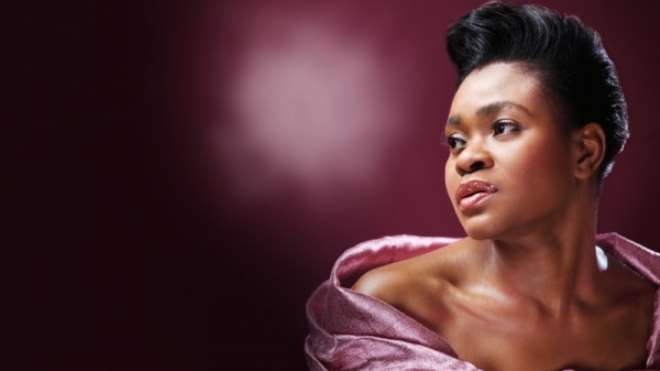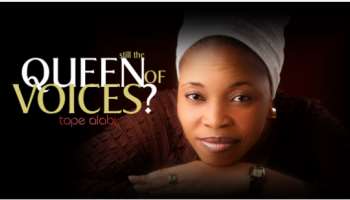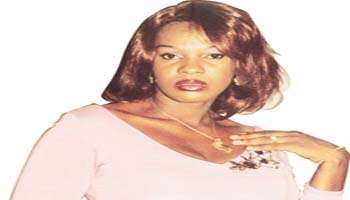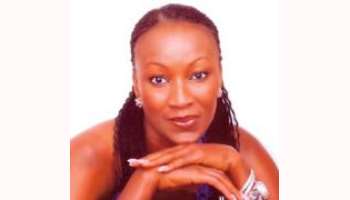AFRICAN DESIGNER DEOLA SAGOE TALKS TO ESSENCE
African designers are having a very good year. In just a matter of months designers like Duro Olowu, Mataano and Mimi Plange are pushing their way to the forefront landing in big magazines and on even bigger stars. Chief among them are Deola Sagoe, the Nigerian born beauty is making a splash in her homeland and abroad with chic pieces which offer flun, feminiinty with all the authenticity of African fabrics and prints.
Deola Sagoe was interviewed by leading Black Women's Magazine Essence.
Excerpt from the interview.
You've become very well known among African fashion enthusiasts. How do you feel about that success?
From the start I always wanted to represent the African woman in terms anybody anywhere would describe as beautiful. I'm Nigerian, I grew up with a lot of natural beauty around me, just here and there without pretension. I was amazed by the beauty of the women I grew up with and the way they embodied my culture. This is perhaps the ultimate success of my brand - that we have been able to give the African woman, and more widely the black woman, her own pedestal where she stands in all her beauty and is admired the world over.
After two decades of being in business, what defines my success is that I fused my cultural heritage with an intrinsic sense of beauty and came up with designs that contributed to the fashion dialogue. My designs were chosen, they were recognized and have stood the test of time, lately we have been reaching an ever-wider audience and this itself is success...
As an African designer, you are always seen is a representative of that continent. Is that how you wish to be seen, or as a designer with her own unique worldview?
Every true designer I know has his or her own deeply held point of view. This is usually fashioned by their environment and concerns, but also from that uniqueness that comes from within you, and as such is not defined by geography or location. I'm black, I'm a Nigerian, and I'm a woman - guess it's no surprise that you're going to see that in my work no more than if I was Japanese or Dutch.
So you seek to strictly represent your homeland?
I would like to think I represent an Africa that is still yet to be fully appreciated, an Africa that is not just one homogenous blob but a rich continent of diversity and expression. African cultures are so fluid by the way, it's mixes of European, British, French, Portuguese from our colonial past and American coming in from modern day enterprise and international business. If there's a mixing pot somewhere on this Earth it's got to be Africa that's why things are often very rich here.
How does your Nigerian culture in particular inform your work as a designer?
Nigeria is a nation often debated across the world but actually rarely truly investigated. Nigeria is a strong nation; the people are proud and culturally very rich and diverse. For me it's like a goldmine that I can delve into. I go in the mine and when I return to the light I discover that I have gems of every description, and I'm usually surprised! What I mean is, whenever I'm designing I'll start with some element of my culture and then I'll go on and add myself to it, what I'm feeling at the time, and then, by a miracle, things start to just happen. It's really the most wonderful thing to be a kind of conveyor or channel for something new to come into being, and yet you can feel its lineage.It has a link to history and culture. The Nigerian consciousness has yet to be fully explored but everyday it keeps offering up gems.
You've had the opportunity to show your collection at New York Fashion Week in the past, do you have plans to connect/expand more so into the U.S. market in the future?
Every market interests me. A new market means I can get out my ideas further and receive new ideas too. That's the beauty of a global community. America is especially interesting because there is also a mixing of cultures where ideas fuse together and generally advancement occurs. In America you can make ideas of change happen because there are many schools of thought - the many body types and body shapes and different aesthetic points of view are all rubbing against each other and this creates energy.
Where we are right now at Deola Sagoe is in the enviable position of being very good at what we do. We are very refined and distilled, from the fabrics we create to the techniques we use to make our garments... The U.S. market is always interested in something good and we kind of feel that right now 'we have the goodness' as it were... (Laughs)
Who is the Deola Sagoe woman?
The Deola Sagoe woman has the mysterious and engaging complexity that is a gift to all women.One day she is dead serious the next she has the naughtiest sense of humor. One day she is all woman the next she is ingénue. She appreciates meaning in things though, she likes to know that she is part of something larger than just her self- hence her appreciation of our fabrics, which have history (and majesty frankly). She definitely enjoys standing out, she is not a worker bee, but finds it far more interesting when everyone has a different point of view and yet everyone can still get along. She is colorful - she uses color to mirror her mood.
There's a debate going on about whether African designers should feel obligated to use African print in all of their collections. How do you feel about this and do you feel you have a duty to use African prints?
I've never been interested much in restrictions. 'I must be this way and you must be that way' - limiting. And frankly, we do not have the time to be overawed by limits. I use African fabrics but I often mix with many other fabrics. I would actually like to see other designers of the world take an interest in African fabrics. They don't appear to know that much about our fabrics as we have learned a lot about theirs. Also, it's bigger really than prints, which represent only one typology of fabric techniques, mark my words there are so many African fabrics, derived from ingenuitive materials, or made with special techniques... It's like a said before... a treasure trove.
Latest News
-
 Division Among Nigerians As Cubana Chief Priest Is
Division Among Nigerians As Cubana Chief Priest Is -
 Cubana Chief Priest Pleads Not Guilty To Charges O
Cubana Chief Priest Pleads Not Guilty To Charges O -
 BBNAIJA Star, Mercy Eke Hospitalized After Partyin
BBNAIJA Star, Mercy Eke Hospitalized After Partyin -
 Regina Daniels Pays Tribute To Late Junior Pope
Regina Daniels Pays Tribute To Late Junior Pope -
 “Internal Bleeding” : Singer Khaid Is Reportedly H
“Internal Bleeding” : Singer Khaid Is Reportedly H -
 Davido Reveals Admiration For Rihanna, Wants To Wo
Davido Reveals Admiration For Rihanna, Wants To Wo -
 Cubana Chief Priest In Hot Waters With EFCC Over
Cubana Chief Priest In Hot Waters With EFCC Over -
 Young John Reveals Reason For Leaving Production F
Young John Reveals Reason For Leaving Production F -
 “The Apology Should Be As Loud As The Disgrace”- D
“The Apology Should Be As Loud As The Disgrace”- D -
 Yul Edochie Throws Shade At Unidentified Person In
Yul Edochie Throws Shade At Unidentified Person In














